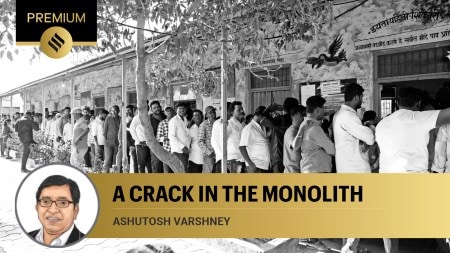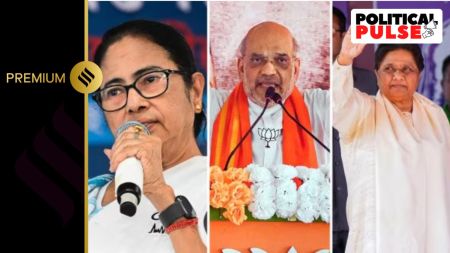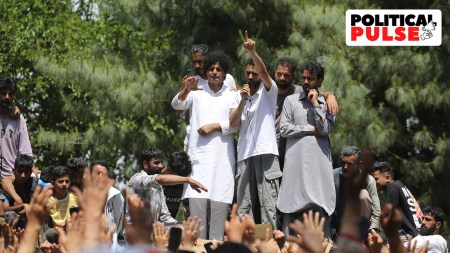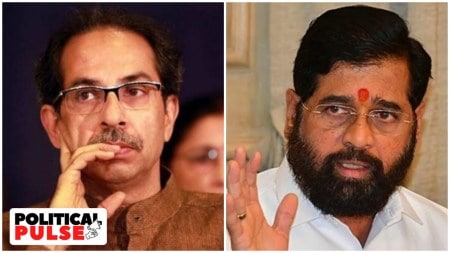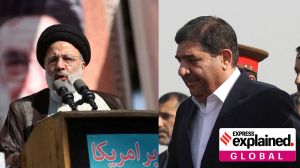- India
- International
Explained: The new process for picking Election Commissioners, why it was brought in
This is the first time a consultative process to appoint an Election Commissioner is being used. It was put in place after a Supreme Court verdict and a new law. Here is what the change is, and what prompted it.
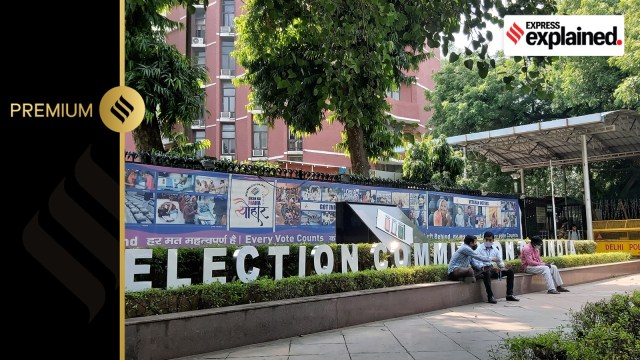 The selection will be made by a committee comprising Prime Minister Narendra Modi, Lok Sabha Leader of Opposition Adhir Ranjan Chowdhury, and a Union minister. (File photo)
The selection will be made by a committee comprising Prime Minister Narendra Modi, Lok Sabha Leader of Opposition Adhir Ranjan Chowdhury, and a Union minister. (File photo)Election Commissioner Anup Chandra Pandey is set to retire on February 14, and his successor will be picked through a consultative process being adopted for the first time.
The selection will be made by a committee comprising Prime Minister Narendra Modi, Lok Sabha Leader of Opposition Adhir Ranjan Chowdhury, and a Union minister. A similar committee, comprising the PM, Chowdhury, and Home Minister Amit Shah, met on Wednesday to appoint the Lokpal and the Central Vigilance Commissioner.
Before this, members of the Election Commission were appointed solely at the discretion of the government. The two other members of the Commission are Chief Election Commissioner Rajiv Kumar and Arun Goel.
What prompted the change?
It was the Supreme Court that forced the government’s hand. Four petitions were filed before the apex court in 2015, 2017, 2021, and 2022, which broadly called for a fair and transparent system to choose Election Commissioners.
On October 23, 2018, while considering the 2015 petition, a two-judge bench felt that the matter required interpretation of Article 324 of the Constitution, which deals with the role of the Election Commission of India. This issue hadn’t been discussed before in the Supreme Court, and so it was referred to a Constitution bench. In September 2022, a five-judge Constitution bench led by Justice KM Joseph started hearing the petitions.

The petitioners pointed out that Article 324(2) specifies the President’s role in appointing Election Commissioners, with the caveat that this appointment is subject to any law passed by Parliament. However, successive governments had not shown any inclination to enact such a law. They criticised the current appointment system for being opaque and said it raises doubts about the institution’s independence. They called for a consultative process in which a collegium or a body of persons is tasked with the responsibility to select the Election Commissioners.
How were Election Commissioners appointed then?
The power to make appointments rested exclusively with the Executive (read: the Union government). The government maintained a database of serving and retired officers, primarily Secretaries to the Government of India and Chief Secretaries, from which the Law Ministry would create a shortlist. The Prime Minister held the power to decide the appointment, with the President formally appointing the chosen candidate.
Notably, past Election Commissioners were predominantly retired officers of the Indian Administrative Services (IAS), with very few exceptions.
What was the Centre’s stand in the SC?
The Centre opposed any intervention by the Supreme Court in the appointments. The government argued that while Article 324 (2) mentions the appointment being subject to a law by Parliament, without such a law, the President had the constitutional power to appoint them. Furthermore, the government stated that the existing procedure had been consistently relied upon by different governments, and that a “utopian model cannot be the premise” for making changes.
The Centre’s legal representatives also argued that the petitioners were unable to demonstrate that the independence of the Election Commission is under threat, and hence, there’s no immediate trigger to warrant judicial interference. Essentially, the government asked the court to show judicial restraint.
What was the Supreme Court’s ruling?
On March 2, 2023, the five-judge bench ruled on the matter.
The Supreme Court delved into the legislative history of Article 324, including the discussions in the Constituent Assembly regarding the role of the Election Commission and the appointment of its members. The Court observed that it was evident that the founding fathers of the Constitution did not want the Executive to have exclusive authority in appointing Election Commission members. Therefore, the inclusion of the words “subject to any law to be made by Parliament” in Article 324 (2) was representative of the need for Parliament to legislate on this matter.
The absence of such a law, the court noted, left a vacuum. Taking note of the “devastating effect of continuing to leave appointments in the sole hands of the Executive’’, the court deemed it appropriate to lay down a process for the appointment of election commissioners. Accordingly, it ruled that “the appointment of the Chief Election Commissioner and the Election Commissioners shall be made by the President on the advice of a Committee consisting of the Prime Minister, the Leader of the Opposition of the Lok Sabha, and in case no Leader of the Opposition is available, the leader of the largest opposition Party in the Lok Sabha in terms of numerical strength, and the Chief Justice of India.”
However, the Court was careful to specify that these norms were “subject to any law to be made by Parliament’. In other words, Parliament was free to enact a law on the appointment process in the future.
Was this the first time a consultative process was considered?
The consultative process ordered by the Supreme Court wasn’t unprecedented. It echoed a similar proposal from the 1990 committee chaired by the then Law Minister Dinesh Goswami. This committee recommended that the President consult the Chief Justice of India and the Leader of the Opposition, or the leader of the largest Opposition group, for appointing the Chief Election Commissioner. For the other two Election Commissioners, the consultation was to involve the Chief Justice of India, the Leader of the Opposition, and the Chief Election Commissioner.
In 2015, the 20th Law Commission’s 255th report also emphasised the need for a consultative process. It suggested the President make appointments after consulting a three-member collegium or selection committee, comprising the Prime Minister, the Leader of the Opposition or the leader of the largest Opposition party in the Lok Sabha, and the Chief Justice of India.
What happened after the SC judgment?
The Centre introduced a Bill in Parliament in August last year, outlining a procedure for appointing Election Commissioners. Since the Court had specified that its appointment norms are “subject to any law to be made by Parliament,” the government was well within its right to bring a Bill. However, the appointment process proposed in the Bill raised concerns regarding its potential to undermine the reforms sought by the Court.
The Bill, passed by Parliament in December 2023, establishes a committee comprising the Prime Minister, the Leader of Opposition in the Lok Sabha, and a Cabinet Minister nominated by the PM. The selection will be made from five names shortlisted by a screening panel headed by the Law Minister and comprising two Union secretaries.
The composition of the committee was criticised by the Opposition. This is because, as per the intent of the Constitution’s framers, the Election Commission should be an independent body. The proposed committee’s composition effectively sidelines the Leader of Opposition, who could be consistently outvoted by the Prime Minister and the Union minister.
This Bill was passed by Parliament in December 2023 and the President gave her assent within a week.
More Explained
EXPRESS OPINION
May 20: Latest News
- 01
- 02
- 03
- 04
- 05



